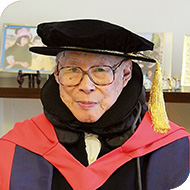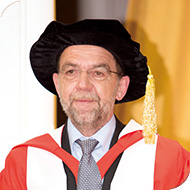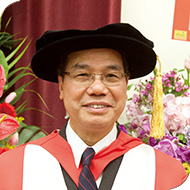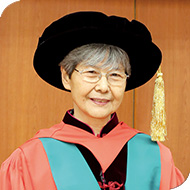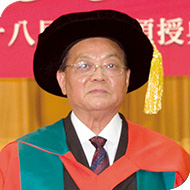| Saluting Pioneers | |
| At the 188th Congregation, six honorary degrees were conferred on individuals who have made groundbreaking contributions to their fields. The recipients included Mr Patrick Yu Shuk-siu, Professor Sir Alec John Jeffreys, who also gave an acceptance speech on behalf of all recipients, Professor Mai Yiuwing, Professor Fan Jinshi, Professor Wang Shenghong and Mr Rocco Yim Sen-kee. They received their awards at a ceremony in March, presided over by HKU’s Pro-Chancellor Dr the Honourable David Li Kwok-po. |
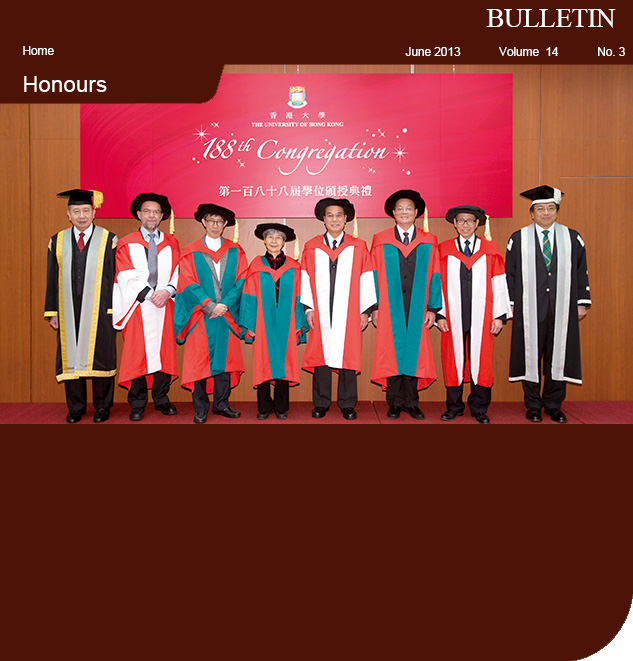
|
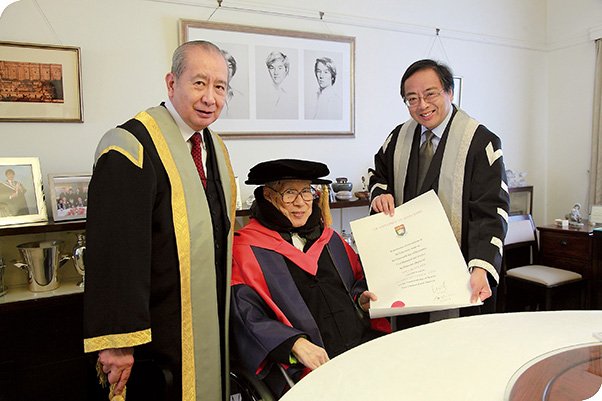 Mr Patrick Yu Shuk-siu was formally presented with his honorary degree by the Pro-Chancellor Dr the Honourable David Li Kwok-po and Vice-Chancellor Professor Lap-Chee Tsui in a ceremony held at his home. Mr Patrick Yu Shuk-siu was formally presented with his honorary degree by the Pro-Chancellor Dr the Honourable David Li Kwok-po and Vice-Chancellor Professor Lap-Chee Tsui in a ceremony held at his home. |
Mr Patrick Yu Shuk-siu Doctor of Laws honoris causaPatrick Yu has been a role model of integrity, moral courage and dignity. He was the first Chinese Crown Counsel in Hong Kong, the foremost criminal lawyer in Hong Kong and one of the Founders of HKU’s Faculty of Law. He was also a steadfast critic of the discriminatory employment terms that were common under the colonial administration. Mr Yu was born in 1922 and attended HKU for three years before his studies were interrupted by the WWII. He escaped to China and served with the British and Republic of China intelligence corps, but his education was not forgotten. He was awarded a wartime degree and in 1945 received a Hong Kong government scholarship to study at Oxford University. Mr Yu returned to Hong Kong in 1951 to take up the Crown Counsel appointment. Expatriates enjoyed more generous terms than locals and he found the discrimination intolerable, so he decided to enter private practice after one year. By the mid-1960s he was Hong Kong’s top criminal lawyer. It was during this time that he also played a leading role in the establishment of the Law School (later the Faculty of Law) at HKU. In the 1970s Mr Yu was offered a Supreme Court judgeship three times, but he turned down each offer due to the continued unequal employment terms. He remained a private practitioner until his retirement in 1983. He has since written two autobiographies and remains a Life Member of the Hong Kong Bar Association. |
|
Professor Sir Alec John Jeffreys Doctor of Science honoris causaTelevision crime shows, let alone medical science and law enforcement agencies, owe a great debt to Sir Alec Jeffreys, who pioneered DNA fingerprinting. The renowned geneticist was looking at an X-ray image of DNA from various individuals on September 10, 1984 when it suddenly struck him that people could be identified by the variations in their individual genetic code. “Most scientific research is a slow, painful slog, a sort of three steps forward, two steps back,” he said afterwards. “What we had was a rare thing in science and that was my eureka moment when we first stumbled upon the whole idea of DNA fingerprinting.” The discovery revolutionised legal and forensic science. It is used globally to identify perpetrators of crime, settle paternity and immigration disputes, and carry out work on non-human species such as wildlife populations. Sir Alec has also made great strides in the study of copy genes, split genes and pseudogenes and currently is developing techniques to detect spontaneous changes in DNA when it is transmitted from parent to child. He has been widely honoured for his work, receiving a Knighthood in 1994, the Louis-Jeantet Prize of Medicine in 2004, the Lasker Prize in 2005 and the Heineken Prize in 2006. Sir Alec spoke at HKU in 2008 and gave this advice to science students and budding CSI investigators: “Go for it. Science is terrific fun. The fact that you can go out with your bare hands and find out interesting things about the world through experimentation never ceases to amaze me.” |
|
Professor Mai Yiu-wing Doctor of Science honoris causaFor decades asbestos was an important ingredient in cement but it had one major drawback: it was a known carcinogen. Thanks to the work of Professor Mai Yiu-wing, there is now an effective asbestos-free cement in the market. It is one of his many contributions in the field of mechanical engineering. Professor Mai was born and educated in Hong Kong, coming from working class roots to achieve international recognition for his achievements. His secondary school education was in a technical school where he learned woodwork, metalwork and geometrical and machine drawing, which would serve him well during his university studies at HKU. He obtained his PhD from HKU and went on to join the University of Sydney, where he developed the asbestos-free cement that not only protected workers lives, but also performed better as a building material. He has also made significant lasting contributions in fracture mechanics and advanced engineering materials, including composite interfaces and crack-wake bridging, which has revolutionised the microstructure design of tough fibre composites and ceramics. His work on cellulose fibre cements has pioneered a new research area called ‘quasi-brittle fracture mechanics’, an important breakthrough in scientific knowledge. Professor Mai has maintained a close relationship with Hong Kong and HKU over the years, and is an Honorary Professor in the Faculty of Engineering. His personal philosophy is to not expect too much so you will not be disappointed. In that respect he has exceeded expectations many times over and had many happy surprises over the years. |
|
Professor Fan Jinshi Doctor of Social Sciences honoris causaProfessor Fan Jinshi first went to study the Dunhuang Grottoes in 1963 straight after graduating in archaeology at the University of Peking. She expected to stay three years on the remote site – which had no running water or electricity – but actually stayed more than 50 years. In fact, so selflessly has she devoted her life to the study and preservation of the caves that she has become known as the ‘daughter of Dunhuang’. Now designated a UNESCO World Heritage Site, the caves date back to the fourth century and served as places of meditation for Buddhist monks. Professor Fan has been instrumental in the preserving of 735 of the caves, more than 45,000m2 of frescoes and more than 2,000 sculptures. Her many breakthroughs include grotto preservation technologies, particularly of frescoes, the consolidation of cliffs and the reduction of the impact of sandstorms on the treasures. She is now working on a ‘Digital Dunhuang’ project, which will enable visitors to take a virtual tour of the caves, thereby enabling more people to see the caves but also reducing the risk of damage to the actual site. Of her work of custodianship she has said: “The caves are like an old person who needs to be taken care of constantly. Protecting the caves is an endless project since you can never say how healthy an old person is. She can get out of the hospital today and go right back in tomorrow.” Professor Fan has won numerous awards for her dedication to preservation, including the ‘National Outstanding Professional and Technical Personnel Award’ from four Mainland ministries in 2004. |
|
Professor Wang Shenghong Doctor of Social Sciences honoris causaA renowned and innovative scientist with a life-long devotion to investigating space, Professor Wang is equally passionate about educating the young. As a child, Professor Wang was inspired by the night sky, even making his own telescope while still at high school. He decided to reach for the stars in his own way, studying precision tracking radar at the Shanghai University of Science and Technology and continuing his research in the US from 1981 to 1983. Much of his work has concentrated on structural design, computational mechanics and numerical optimisation software development for large-scale electronic equipment, including radio telescopes, satellite earth station and precision tracking radars. Numerous projects range from construction of a 20-metre Satellite Antenna System within the KC Frequency Range while he was Associate Director of the China Electro-Mechanical Engineering Association to collaborating with the University of Texas to construct the largest astronomy telescope in the world. Professor Wang’s achievements as an educator have also been manifold. He was appointed Executive Vice-President of Shanghai University of Science and Technology in 1984, was President of Shanghai University from 1987 to 1993 and President of Fudan University, from 1998 until his retirement in 2009. He has also been involved in education in Hong Kong as a Member of the University Grants Committee. He believes that education is meant to inspire enthusiasm for creation, a passion for life and the pursuit of ultimate truth and good. |
|
Mr Rocco Yim Sen-kee Doctor of Social Sciences honoris causaHKU alumnus Rocco Yim Sen-kee is probably Hong Kong’s most internationally acclaimed, locally born and educated architect. He graduated from HKU with a Bachelor of Arts in Architectural Studies in 1974 and a Bachelor of Architecture in 1976, and soon afterwards started the firm that in 1982 would become Rocco Design Architects Ltd in partnership with Patrick Lee and Bernard Hui. Rocco and his colleagues have designed many famous buildings across the globe. In Hong Kong his landmark buildings include Citibank Plaza, iSQUARE in Tsim Sha Tsui, and the new Government Headquarters on the Tamar site known as ‘The Open Door’, a design which, according to Rocco, celebrates Hong Kong’s spirit of inclusiveness, tolerance and acceptance of cultures from different parts of the world. Rocco’s philosophy is that architecture is not just an art. It is the art of problem solving which contributes to environmental and spiritual well-being. “Architects have to avoid being self-centred,” he has said. “You have to be concerned not just with what you do or who you are; you have to be concerned with the effects of what you are creating towards the neighbourhood and that which happens around you. The architecture you produce, in particular the empathy and sensitivity that it embodies, is ultimately a reflection of your personality.” His designs have won prestigious awards all around the world, but he has never forgotten his home at HKU where he has left a lasting physical reminder in the form of Graduate House, which was awarded a Silver Medal for design excellence by the Hong Kong Institute of Architects. |
